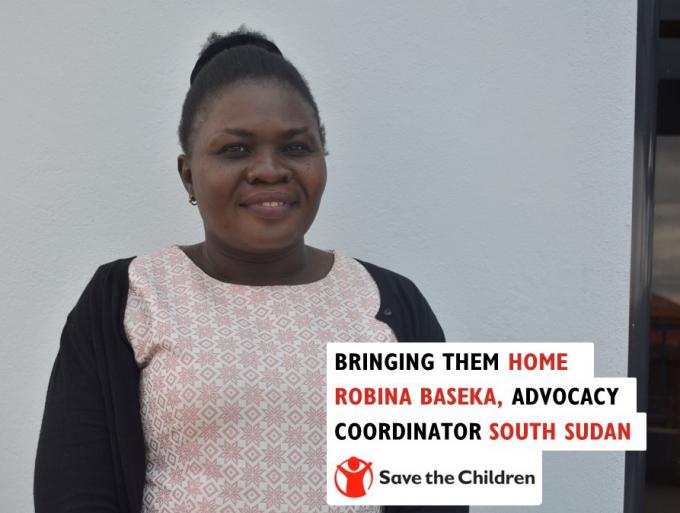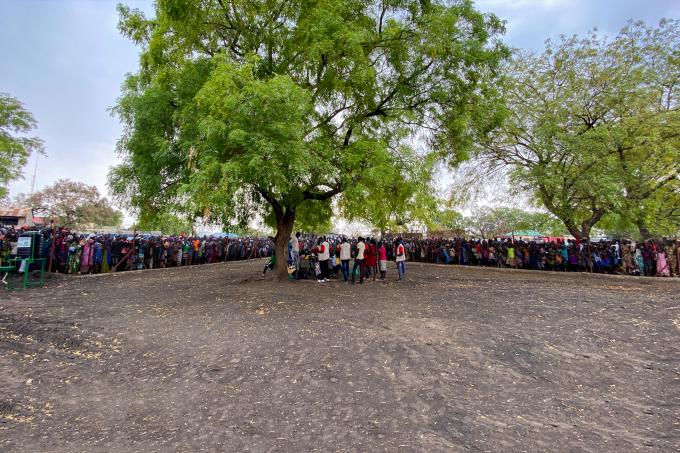Bringing Them Home: Reconciling Communities Through the Return of Abducted Children and Women in Jonglei State
In this Blog Robina Baseka – Save the Children’s Advocacy & Campaigns Coordinator in South Sudan - gives an insight on her experience during the reunification process.

The first of April 2021 marked a key milestone in the history of Greater Jonglei, and in particular the counties of Pibor and Uror –Pieri, in South Sudan. It was the month when an agreement was finally brokered between these counties to facilitate the return of 58 abducted children and women to their families.
For many years, the different communities in Jonglei State had been involved in inter communal violence related to cattle wrestling and revenge killings and attacks. Last year more than 1000 people were wounded or killed[1] from the different communities as a result. Children have borne the brunt of this violence, in particular girls, who have been subjected to rape, forced marriage and sexual enslavement[2]. Abductions in particular are a longstanding practice in South Sudan, and most abductees never see their families again. In Jonglei alone, there have been at least 686 abductions (96% women and children) and among them, 434 reported between January and August 2020 alone.
Nyanlouk*, 21, is a testament to how long this practice has taken place; she was abducted from her family 12 years ago as a young girl. Now, she has returned to her home in Pieri as an adult.
To reduce the cycle of violence and abductions, Save the Children and Community Empowerment for Progress Organization (CEPO) in partnership with UNHCR, UNMISS and local partners are implementing a project “Reducing violence and intercommunal conflict in Jonglei State and GPAA by preventing the abduction of women and children and facilitating their release” funded by the Reconciliation, Stabilization and Resilience Trust Fund (RSRTF).
Under this project, Save the Children and its partners have successfully facilitated the return the first batch of 58 women and children from Pieri to their families in April 2021. These who were returned were welcomed to cheers, ululation and tears of joy as they were handed over to the local authorities. In the same spirit of peace, the abducted children and women in Pibor were handed over to Pieri authorities in exchange, as the terms set during the community dialogue attended by both communities.
On the day of the reunifications, both communities anxiously waited, crowds gathered before the arrival of the planes the airstrip, which were already filled with such multitudes of people that one could easily get lost in the crowds. The multitude could be compared to spectators watching football at a stadium; however, these people weren’t here for sport, but were relatives and community members waiting for triumphant return of much-loved family members who many hadn’t seen for years.

“This is the first time that children and women who have been abducted from their families have been peacefully released and returned to the local authorities, before being reunited with their families,” said one of the partners.
Kong* 15, was among the group of children heading to Pieri. He was abducted five years ago, at the age of 10, while playing around his school. When I spoke to him, Kong said he was happy to finally return home. “I feel happy because am going home, I have missed my family and school, I want to go back to school,” he said.
At the much awaited time for check-in, Kong posed for a few pictures with his friends, before being dropped off at the air strip. He bid farewell to Pibor, and waved his goodbyes. For Kong and many children, Pibor had become their home, but when it came time to leave, you could see them beaming with ear to ear smiles on their faces.
After an hour or so of flight, it finally landed in Pieri and, like in Pibor, the team was received by hundreds of people who were already waiting, as customs demand the children were then taken through a traditional ceremony officiated by a traditional leader before being taken to the care Centre.
This is not the end of the process, however. Once on the ground, Kong and the other children still have to undergo family tracing and re-unification. “It’s much easy to reunify children who are able to remember their parents’ names and villages”, said Peter one of the Save the Children’s partner staff escorting the children, “but those who can’t it will take a while and Pieri will be home until their parents are located.”
The long journey between Pibor to Pieri and back had finally paid off thanks to the support of government and partners. The success of the work needed serious coordination working with the local authorities and partners to build trust among communities by addressing triggers of violence and reconciling these communities to embrace peace.
In coming months, together with our partner’s with support from the government and local authorities, we’ll continue to support family tracing and reunification of abducted children until the last child is reunified with their families.
Save the Children (SCI) is supporting the tracing, return and reunification of abducted women and children in Pibor, Bor, Uror and Duk counties, in Jonglei State with local organizations, GREDO, CINA and CAO.
[1] https://unmiss.unmissions.org/sites/default/files/unmiss_annual_brief_vi...
[2] https://www.ohchr.org/Documents/Countries/SS/Jonglei-report.pdf
 South Sudan
South Sudan